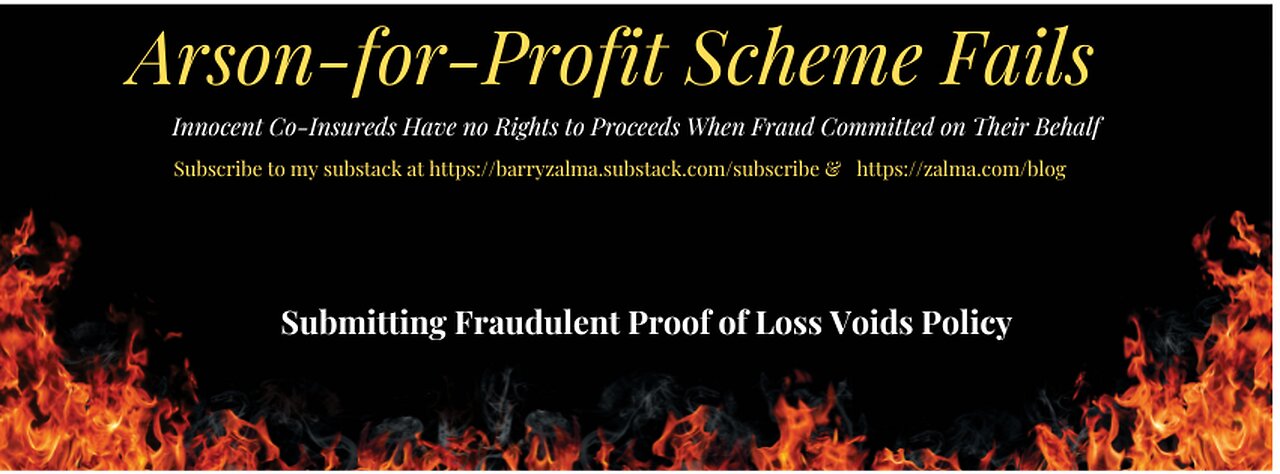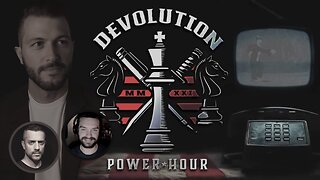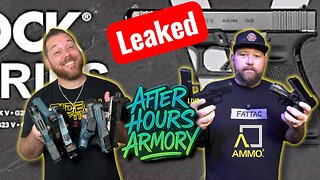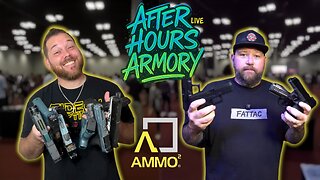Premium Only Content

Arson-for-Profit Scheme Fails
Innocent Co-Insureds Have no Rights to Proceeds When Fraud Committed on Their Behalf
Post 4808
Plaintiffs Timeless Bar, Inc. and Horseshoe Club, LLC sued their insurer, Defendant Illinois Casualty Company, claiming the latter breached the parties' insurance agreement. Specifically, the Plaintiffs allege that even though the fire that destroyed their property was intentionally set by an officer of the corporation and a member of the LLC, the insurer was obligated under the policy and Minnesota law to pay for the loss.
In Timeless Bar, Inc., doing business as The Press Bar and Parlor, and Horseshoe Club, LLC v. Illinois Casualty Company, No. 22-cv-1685 (KMM/LIB), United States District Court, D. Minnesota (May 21, 2024) the USDC, in a lengthy opinion resolved the issues of who was responsible for the fraud.
BACKGROUND
In April 2016, while still a married couple, Andrew Welsh and Jessie Welsh purchased a bar in St. Cloud, Minnesota. The couple opened the business as The Press Bar and Parlor and operated it through a corporation, Timeless Bar, Inc. (“Timeless Bar”). They also set up a real estate holding company, Horseshoe Club, LLC (“Horseshoe Club”), and arranged the building purchase through that company. On February 17, 2020 a fire that destroyed the bar. The Defendant and law enforcement later discovered that Andrew intentionally set the fire.
Illinois Casualty Company (“ICC”) insured The Horseshoe Club against the risk of loss by fire and covered as an additional named insured - “building owner” - for certain losses associated with the building itself under the Policy.
The Arson and Plaintiffs' Insurance Claims
On February 17, 2020, Andrew Welsh burned down the bar. The following day, Andrew executed a Non-Waiver Agreement with ICC as the authorized representative of Timeless Bar as a named insured under the Policy. On February 26, 2020, Timeless Bar and the Horseshoe Club submitted the initial insurance claim to ICC via a “Proof of Loss” seeking approximately $1.4M in proceeds. The initial claim sought the policy limits for the building and other amounts. The claim states that the fire was of “unknown origin.” Further, the sworn proof of loss states: That said loss did not originate by any act, design or procurement on the part of your insured, or as affiant; nothing has been done by or with the privity or consent of your insured or this affiant, to violate the conditions of the policy, or render it void. Andrew and Jessie both signed that proof of loss on behalf of the businesses. There is no dispute that in the proof of loss, Andrew falsely stated that the fire was of unknown origin and that the loss did not originate by any act, design, or procurement of his own. Nor is there any dispute that his submission of the false claim as an affiant on behalf of the insured was an effort to defraud ICC.
DISCUSSION
The crux of the dispute in this case is whether Andrew Welsh's conduct-burning down the bar and later lying about it in the insurance claims-allows ICC to deny coverage to Timeless Bar and Horseshoe Club. ICC argued that Andrew's conduct is imputable to the Plaintiffs for purposes of all three exclusions at issue: his submission of fraudulent insurance claims precludes coverage for the Plaintiffs under the Misrepresentation and Dishonesty Exclusions, and his arson precludes coverage under the Intentional Acts Exclusion.
As explained below, the Court found that there is no genuine dispute that Andrew filed fraudulent claims on behalf of both Timeless Bar and Horseshoe Club. Because he did so, no reasonable jury could find that ICC breached the Policy by denying coverage under either the Misrepresentation Exclusion or the Dishonesty Exclusion.
Misrepresentation and Dishonesty Exclusions
ICC is entitled to judgment as a matter of law because the Policy provides no coverage. He filed a fraudulent claim when he signed the original Proof of Loss on February 26, 2020, and the May 15, 2020 amended Proof of Loss. No reasonable jury could conclude otherwise based on this record.
“Innocent Insureds”
Minn. Stat. § 65A.01, subd. 3, provided that the entire policy was void if, either before or after a loss, “the insured has willfully and with intent to defraud, concealed or misrepresented any material fact or circumstance concerning this insurance or the subject thereof or the interests of the insured therein.” (emphasis in the original)
The Court found that, even viewed in the light most favorable to Plaintiffs, Andrew's false statements in the proofs of loss submitted to ICC were dishonest acts and were made with intent to defraud ICC, and his actions are properly imputed to Timeless Bar and Horseshoe Club for purposes of applying the Misrepresentation and Dishonesty Exclusions.
Andrew's actions are imputed to the Plaintiffs, the Misrepresentation Exclusion and the Dishonesty Exclusion preclude coverage as a matter of law, and ICC is entitled to summary judgment.
ZALMA OPINION
Arson-for-Profit is a serious crime. An arson fire is a specifically peril, the risk of loss of which, is insured by a fire policy. There is no "arson" exclusion in a fire insurance policy. The named insured may go to jail for the crime but that does not effect the insurance claim. Where Welsh went wrong was in signing under oath a false claim as a result of the fire. The fraud voided coverage and no one had the right to recover even his innocent wife and the innocent corporations who owned the building where the bar was located.
(c) 2024 Barry Zalma & ClaimSchool, Inc.
Please tell your friends and colleagues about this blog and the videos and let them subscribe to the blog and the videos.
Subscribe to my substack at https://barryzalma.substack.com/subscribe
Go to X @bzalma; Go to Newsbreak.com https://www.newsbreak.com/@c/1653419?s=01; Go to Barry Zalma videos at Rumble.com at https://rumble.com/c/c-262921; Go to Barry Zalma on YouTube- https://www.youtube.com/channel/UCysiZklEtxZsSF9DfC0Expg.
Go to the Insurance Claims Library – https://lnkd.in/gwEYk
-
 2:02:46
2:02:46
Badlands Media
1 day agoDevolution Power Hour Ep. 405: Live from Cocoa Beach
98.1K31 -
 1:33:56
1:33:56
Man in America
8 hours agoElon Says the Quiet Part Out Loud: AI Will RULE Humans, No More Money, BILLIONS of Robots
40.7K18 -
 51:25
51:25
The Connect: With Johnny Mitchell
9 hours ago $10.07 earnedInside The REAL Narco State: The Colombian Drug Cartels DOMINATING The Global Cocaine Trade
16.7K3 -
 3:57:53
3:57:53
MattMorseTV
6 hours ago $98.32 earned🔴Saturday Night NEWS + DRAMA.🔴
101K42 -
 2:02:09
2:02:09
BlackDiamondGunsandGear
8 hours agoAfter Hours Armory / Leaked GLOCK images / Gunderware
14.4K2 -
 6:19:17
6:19:17
SpartakusLIVE
6 hours agoSaturday SPARTOONS || WZ to Start - REDSEC or ARC Later???
23K -
 19:23
19:23
Clintonjaws
23 hours ago $9.26 earnedKaroline Leavitt STOPS Trump's Meeting & Grills Reporters Leaving Them Speechless
27.9K21 -

DLDAfterDark
3 hours ago $0.46 earnedYou Keep a GUN Inside Your Draws?? Let's Talk About Your Tactical Undies
9.72K4 -
 7:02:59
7:02:59
DeadMomAlive
8 hours agoFace Paint Satur-SLAY! Fall Pumpkin! #BIRTHDAYMONTH
15.3K3 -
 2:10:24
2:10:24
RiftTV
8 hours agoThe Death Rattle Of Con Inc BEGINS | SLIGHTLY OFFENSIVE
40.6K7